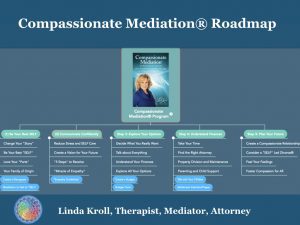Linda’s Suggestions for Talking with Your Children about Your Separation or Divorce
Choose a time to tell the children when you can be together. If you have children of various ages, you may tell them at different times as your conversations not be the same. Whether you tell all the children at the same time, you should both be together whenever you tell any child.
Sometimes, you first tell your children that you are planning to separate. This can be less painful than the “divorce discussion”, but often a “separation” is just a euphemism for divorce. Use “separation” if it applies to the following:
Plan what you are going to say, and who is going to say what. It probably won’t go as planned, but if you have talked about it first, then you can feel a little more secure that one or both of you will know what to say. Or what not to say. Also, saying it aloud for the first time without the children present may allow you to cry or feel your feelings before you meet with them. The more calm you are when you speak to your children, the more calm they can be. The more respectful you can each be of the other creates the most safety for your children.
Remember that the greatest gift you can give your children is to minimize conflict between you. Much has been written about the aftermath of divorce and how it adversely affects your children. By the time you are ready to have this discussion, you may have exhausted your possibilities of reconciliation. I believe that the most harm to our children comes from the pain we inflict on our spouses. The more we show compassion and respect, the more we enhance the quality of our children’s lives.
Plan a time that you can talk about your plans to divorce, and then have time afterwards to process the discussion. Don’t tell them when the children have to go somewhere right after the talk. You wouldn’t tell your teenager before she goes to a party, nor would you tell your younger children right before they leave for school. Sometimes parents have planned to take the children to a park, have dinner together, or do something afterwards that can assure your children that you can all be friendly during and after this process. This may feel impossible to you, so just structure the timing that you can both be available to your children after the talk.
Tell your children that you want to talk with them. Sometimes, before you say anything, your children will say “you’re getting divorced”. Other times, they know and don’t believe it or feel that if they don’t speak about it then it can’t be real.
Let them know that you love them and you will both always be there for them. Children get scared at the idea of divorce, just as you do. Knowing that they will always have love from both of you can make them feel safer.
Assure them this is not their fault. Children tend to think they did something wrong or might have caused the break up.
You can say that you have some issues between the two of you that made you both decide you were going to get divorced. Even though one of you might have brought up divorce before your spouse, very few people want to be married to someone who does not want to be married to them. Whether you realize it yet or not, there were factors in your relationship that made it difficult for both of you. Probably neither one of you has been happy for a long time.
It is not your children’s business to know what your “issues” are. This is where boundaries in the discussion are very important. Whether there has been an affair, an addiction, or abuse, it is not necessary to talk about it now (or possibly ever) with them. The reasons are your reasons, and telling them just allows one of you to vent at your children’s expense.
They will ask what those reasons are. You and gently, but firmly, let them know that you will not be telling. them. You will have to be consistent with this, as they will continue to ask even after the talk. It will often take a great deal of restraint and maturity for you to hold this boundary. You might want to them “your side of the story”. However, there are always two sides to a story, and the children do not need to be in the middle of it.
Remember that anything negative you say about the other parent reverberates in your children’s hearts. You are speaking about 50% of who they are. A judgment of your spouse implicitly becomes a criticism of them as well.
Tell them that you will always be available to discuss their feelings with them. Let them know that it is normal to feel sad, scared, angry, hurt, and that they can talk to both of you at any time about what they are feeling.
Don’t make your children your confidantes. You are there to listen to them, but they do not have to be burdened with your emotions. Many sensitive children take it on as their responsibility to help Mommy or Daddy and “make them happy”. This scenario should be avoided at all costs. (Alice Walker’s Drama of the Gifted Child addresses the issues that arise for children who think they must be caretakers of their parents.)
Let them know that you will take care of yourself and they don’t have to take care of you. You can tell them that you are seeing a counselor, have joined a support group, or have many friends who are there to assist you.
If it seems helpful at this time, tell them about “Rainbows”, a place where they can talk about their feelings with other children who are going through the same thing. Rainbows (www.rainbows.org) is an international organization started by Suzy Yehl Marta to help children whose parents were going through a divorce. Rainbows offers free support groups that are age appropriate in your neighborhood. These groups last six weeks and are facilitated by trained volunteers.
Answer their questions that are their concerns. Your children may want to know where they will be living, what school they will attend, who will be leaving the house and when, where will the other parent live, when will they see them. To the extent that you know the answers, let your children have this information. Whatever questions are still unanswered, tell them you will let them know as soon as you make those decisions.
Ask them if they want to talk about their feelings now. They may cry, they may yell, they may want to go out and play with their friends. Don’t be surprised at any response. Just be there to hear them and to hold them.
When the talk is over, you can go somewhere in private to process your own tears, or your relief. And then go do something nurturing with your children, or if they are not available, then nurturing to yourself.
One of the hardest parts is over. Now you can live congruently and compassionately.
You don’t have to hide the reality, and now your children can begin to talk about their feelings, fears, concerns. It will usually be a relief to you because you don’t have to hide anything from them any more.
Your children may have questions in the future. Let them know they can ask you about issues that pertain to them. And keep your boundaries clear.
Have compassion for everyone, including yourself.
To order my book, please click here.
To get a FREE CHAPTER, please click here.
To join me in my Compassionate Mediation Program, click HERE.



